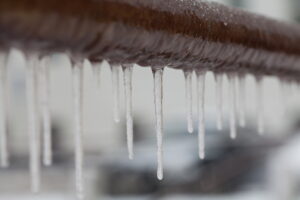
The summer weather is still here and it’s still hot—so we thought we’d cool you down a bit with some talk of ice. Specifically, we’re going to answer a question many homeowners have about winter conditions and their plumbing: Why do water pipes sometimes burst in the winter?
We’re not talking about this just as a nice break from the heat. Fall is almost here, and that’s the time to make preparations to prevent pipe bursting in the winter. A bit of precaution goes a long way when it comes to stopping this problem in your home. If you’re already noticing low water pressure at home, it could indicate underlying issues that may worsen in the winter.
The Cause of Burst Pipes
The basic source of burst water pipes is pipe freeze. You obviously don’t want the water in your pipes to freeze because that will mean no water flow. But it also creates the high likelihood that the pipe will burst laterally and need to be replaced.
The reason that frozen pipes often burst is because water takes up more space in solid form (ice) than in liquid form. As water freezes, its molecules crystalize into a matrix shaped like an open hexagon, and this expands the area the water takes up. If you’ve ever poured water into a glass and put it into the freezer by accident, you may find the glass has cracked later after the water froze: the rigid and fragile glass couldn’t expand to match the expanse of the ice.
Pipes are made of material that’s much more durable than glass, but the pipes don’t burst just because the water expanded as it froze. No, the real problem here is an increase in pressure inside the pipe. As the ice expands, it creates greater pressure in the pipe between the ice and a closed faucet. This pressure can be enough to cause a lateral burst along the pipe. If there are any weak spots in a pipe, such as loose connections, bursting can happen even easier.
Steel pipes are the most susceptible to bursting because of their age and rigidity. Copper pipes are more flexible, but they can burst as well. Not even PEX and PVC plastic pipes are immune to bursting—it just may take them longer to reach the bursting point. If you’ve experienced unusual plumbing behavior, such as knocking noises in your walls, it might indicate weak spots in your pipes that need attention before winter.
If you do encounter frozen pipes, please don’t attempt to thaw the pipes on your own. This will raise pressure even further in the pipe and cause it to burst.
Frozen pipe prevention
- Exposed pipes, such as in the basement, are at the greatest risk of pipe freeze. To help stop them from freezing, you can purchase special insulation sleeves from a hardware store and cut them to length.
- We recommend you regularly open up faucets to let water drip from them, which lowers pressure and makes it harder for the water to freeze. For additional winter preparation, ensure you address any slab leaks or major pipe issues that could worsen in colder temperatures.
- Always keep your home’s heating system on when you leave for extended periods: lower the thermostat down to 55°F so the house will stay just warm enough to stop pipe freeze.
- Detach and drain all outdoor hoses before winter. An attached hose can lead to ice entering indoor pipes through the hose bib.
Reach out to Crown Group Ohio for all your plumbing needs—Your Comfort Experts Since 1963.
